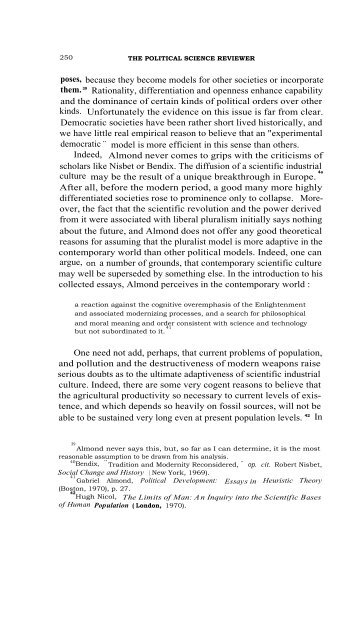FUNCTIONALISM AND ITS CRITICS - Intercollegiate Studies Institute
FUNCTIONALISM AND ITS CRITICS - Intercollegiate Studies Institute
FUNCTIONALISM AND ITS CRITICS - Intercollegiate Studies Institute
You also want an ePaper? Increase the reach of your titles
YUMPU automatically turns print PDFs into web optimized ePapers that Google loves.
250 THE POLITICAL SCIENCE REVIEWER<br />
poses, because they become models for other societies or incorporate<br />
them. 39 Rationality, differentiation and openness enhance capability<br />
and the dominance of certain kinds of political orders over other<br />
kinds. Unfortunately the evidence on this issue is far from clear.<br />
Democratic societies have been rather short lived historically, and<br />
we have little real empirical reason to believe that an "experimental<br />
democratic " model is more efficient in this sense than others.<br />
Indeed, Almond never comes to grips with the criticisms of<br />
scholars like Nisbet or Bendix. The diffusion of a scientific industrial<br />
culture may be the result of a unique breakthrough in Europe. 4o<br />
After all, before the modern period, a good many more highly<br />
differentiated societies rose to prominence only to collapse. Moreover,<br />
the fact that the scientific revolution and the power derived<br />
from it were associated with liberal pluralism initially says nothing<br />
about the future, and Almond does not offer any good theoretical<br />
reasons for assuming that the pluralist model is more adaptive in the<br />
contemporary world than other political models. Indeed, one can<br />
argue, on a number of grounds, that contemporary scientific culture<br />
may well be superseded by something else. In the introduction to his<br />
collected essays, Almond perceives in the contemporary world :<br />
a reaction against the cognitive overemphasis of the Enlightenment<br />
and associated modernizing processes, and a search for philosophical<br />
and moral meaning and order consistent with science and technology<br />
but not subordinated to it. 41<br />
One need not add, perhaps, that current problems of population,<br />
and pollution and the destructiveness of modern weapons raise<br />
serious doubts as to the ultimate adaptiveness of scientific industrial<br />
culture. Indeed, there are some very cogent reasons to believe that<br />
the agricultural productivity so necessary to current levels of existence,<br />
and which depends so heavily on fossil sources, will not be<br />
able to be sustained very long even at present population levels. 42 In<br />
39<br />
Almond never says this, but, so far as I can determine, it is the most<br />
reasonable assumption to be drawn from his analysis.<br />
40 "<br />
Bendix, "<br />
Tradition and Modernity Reconsidered, op. cit. Robert Nisbet,<br />
Social Change and History ( New York, 1969).<br />
41<br />
Gabriel Almond, Political Development: Essays in Heuristic Theory<br />
(Boston, 1970), p. 27.<br />
42<br />
Hugh Nicol, The Limits of Man: An Inquiry into the Scientific Bases<br />
of Human Population ( London, 1970).
















